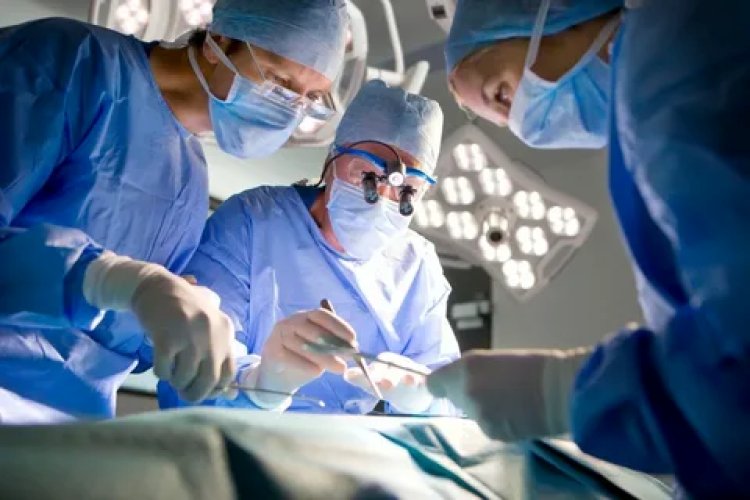A Guide to Vascular Health and Surgery in Dubai
Vascular surgery in Dubai combines innovation and expertise. Learn about various procedures available to manage circulatory issues, including laser therapy, endovenous ablation, and more.
Share this Post to earn Money ( Upto ₹100 per 1000 Views )

Vascular health is an essential aspect of overall well-being, as it involves the circulatory system that supplies oxygen-rich blood to the body. Poor vascular health can lead to serious conditions like varicose veins, peripheral artery disease (PAD), aneurysms, and even stroke. In Dubai, advancements in vascular surgery and a focus on preventative care are transforming the way patients manage their vascular health. This guide will walk you through the basics of vascular health, the types of Vascular Surgery in Dubai available, and how it has become a leader in vascular care.
What is Vascular Health?
Vascular health refers to the condition of your arteries, veins, and capillaries that carry blood throughout the body. When the circulatory system is compromised, it can result in a variety of issues such as blood clots, vein disorders, and blockages in the arteries, which can be life-threatening if left untreated. Key to maintaining vascular health is regular check-ups, a healthy lifestyle, and addressing any circulatory issues early on.
Common Vascular Health Issues
There are several common vascular conditions that people may experience:
- Varicose Veins: Enlarged, twisted veins often seen in the legs due to faulty valves within the veins.
- Peripheral Artery Disease (PAD): A condition in which the arteries that supply blood to the limbs become narrowed or blocked.
- Aneurysms: A bulge in the wall of an artery, often found in the aorta, which can be life-threatening if it ruptures.
- Deep Vein Thrombosis (DVT): A blood clot that forms in a deep vein, typically in the legs, which can cause serious complications like pulmonary embolism.
- Carotid Artery Disease: Narrowing of the carotid arteries, which can increase the risk of stroke.
Signs and Symptoms of Vascular Diseases
Vascular diseases can manifest in a variety of ways, depending on the condition. Some common symptoms to watch for include:
- Leg pain or cramps while walking (a symptom of PAD)
- Swelling, heaviness, or fatigue in the legs
- Visible varicose veins or spider veins
- Numbness or weakness in the limbs
- Non-healing wounds or ulcers on the legs
- Sudden shortness of breath (a symptom of DVT complications)
If you notice any of these symptoms, it is crucial to seek medical advice to prevent further complications.
Why Choose Vascular Surgery in Dubai?
Dubai has rapidly emerged as a global hub for advanced medical care, including vascular surgery. The city boasts world-class hospitals, highly skilled surgeons, and cutting-edge technology that makes it a top choice for patients seeking vascular treatment. Here are some reasons why Dubai stands out:
- State-of-the-Art Facilities: Dubai’s medical centers are equipped with the latest in medical technology, offering minimally invasive procedures and advanced diagnostic tools.
- Highly Qualified Surgeons: Vascular surgeons in Dubai are often trained internationally, bringing a wealth of expertise and knowledge to patient care.
- Comprehensive Care: From diagnosis to surgery and post-operative care, Dubai’s healthcare facilities provide comprehensive vascular health solutions.
- Medical Tourism Hub: Dubai’s reputation as a leading destination for medical tourism means patients can combine world-class medical care with a luxury experience.
Types of Vascular Surgery Available in Dubai
Dubai offers a variety of vascular surgical procedures to treat different conditions, ranging from minimally invasive treatments to more complex surgeries. Some of the most common include:
-
Endovenous Laser Therapy (EVLT): A minimally invasive procedure used to treat varicose veins. The treatment uses laser energy to close off the faulty vein, allowing blood to reroute to healthier veins.
-
Angioplasty and Stenting: A procedure where a balloon is used to open up blocked arteries, and a stent (a tiny metal mesh tube) is placed to keep the artery open. This is commonly used for PAD.
-
Carotid Endarterectomy: A surgical procedure to remove plaque buildup from the carotid arteries in the neck, reducing the risk of stroke.
-
Aneurysm Repair: Aneurysms, particularly in the aorta, can be repaired using open surgery or endovascular techniques, depending on the size and location.
-
Bypass Surgery: If a blood vessel is blocked or narrowed, bypass surgery can be used to redirect blood flow around the blockage using a graft, either from another part of the body or a synthetic material.
-
Sclerotherapy: A procedure used to treat smaller varicose veins or spider veins by injecting a solution directly into the vein, causing it to collapse and fade from view.
-
Thrombectomy: A procedure used to remove a blood clot from a vein or artery to restore normal blood flow.
The Importance of Early Diagnosis and Prevention
Early diagnosis of vascular issues can significantly improve the outcomes of treatment and reduce the need for invasive procedures. Regular check-ups and screenings, especially for those with risk factors such as smoking, obesity, or a family history of vascular disease, are crucial for early detection. Many vascular conditions, if caught early, can be managed with lifestyle changes, medications, or less invasive treatments.
Preparing for Vascular Surgery in Dubai
If you're considering vascular surgery in Dubai, preparation is key to ensuring a smooth process and successful recovery. Here are some steps you may need to follow:
- Consultation: Meet with a vascular specialist who will assess your condition and recommend the best treatment plan.
- Diagnostic Tests: You may need to undergo various tests, such as ultrasounds, CT scans, or MRIs, to get a clear picture of your vascular health.
- Pre-Surgery Instructions: Follow your doctor’s pre-surgery instructions carefully, which may include dietary restrictions or medications to prepare your body for surgery.
- Post-Surgery Arrangements: Plan for a smooth recovery by arranging transportation, preparing your home for rest, and having someone available to assist you during the initial recovery period.
Post-Surgery Care and Recovery
After vascular surgery, the recovery process is crucial to ensure long-term success. Dubai’s hospitals provide detailed aftercare instructions to help patients heal properly and avoid complications. Here are some general post-surgery care tips:
- Follow Medication Guidelines: Take prescribed medications, such as blood thinners or pain relief, as directed by your doctor.
- Stay Active: Light activity, such as walking, is often encouraged to promote circulation and prevent blood clots.
- Wound Care: Keep the surgical site clean and follow the wound care instructions provided by your healthcare team.
- Attend Follow-Up Appointments: Regular check-ups are important to monitor your recovery and address any issues early.
- Maintain a Healthy Lifestyle: Eating a balanced diet, quitting smoking, and exercising regularly can improve vascular health and prevent future complications.
Conclusion: Achieving Optimal Vascular Health in Dubai
Maintaining vascular health is essential for preventing serious complications like stroke, heart attack, and chronic pain. With the advanced medical care available in Dubai, patients have access to cutting-edge treatments and highly skilled vascular surgeons who can provide the best possible outcomes. Whether you're in need of preventative care, minimally invasive procedures, or complex vascular surgery, Dubai offers world-class services to help you maintain a healthy circulatory system and enjoy a better quality of life.

 ambersyed15
ambersyed15 















